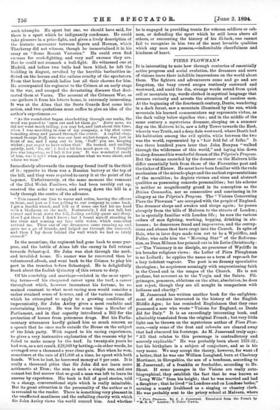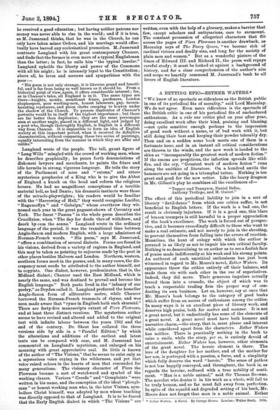PIERS PLOWMAN.*
IT is interesting to note how through centuries of essentially active progress and social evolution, the dreamers and seers of visions leave their indelible impressions on the world about them. The fighters and adventurers come and go and are forgotten, the busy crowd surges restlessly eastward and westward, and amid the din, strange words sound from quiet cell or mountain top, words clothed in mystical language that arouses curiosity and arrests the attention of careless men. At the beginning of the fourteenth century, Dante, wandering in a dark forest, saw a mountain illumined by the sun, which mountain his learned commentators say represents virtue, as the dark valley below signifies vice ; and in the middle of the same century a mysterious dreamer, sleeping on a summer day on the Malvern hi!ls, saw a lofty Tower towards the East, wherein was Truth, and a deep dale westward, where Death had his habitation among the evil spirits, while between the two was the world, represented by a "fair feld ful of folke." It was three hundred years later that John Banyan "walked through the wilderness of this world," and laying him down to sleep dreamed his wonderful dream of the Pilgrim's Progress. But the visions recorded by the dreamer on the Malvern hills differ essentially both from those of the Florentine poet and the tinker of Elstow. He must have been familiar with the rude mechanism of the miracle-plays and the earliest representations of the moralities; he depicts virtues and vices and abstract qualities as possessing concrete personalities ; but his scheme is neither so magnificently grand in its conception as the Divina Commedia, nor so consecutive and convincing in its allegory as the Pilgrim's Progress. The "Visions Concerning Piers the Plowman" are occupied with the people of England. The dreamer sleeps and awakes and sleeps again ; he passes abruptly from the hills of Malvern to the streets of London; he is specially familiar with London life ; he sees the various orders of men fighting, working, begging, drinking in ale- houses ; he denounces fraud and impostures, and the corrup- tions and abuses that have crept into the Church. In spite of Bale, who in later days made him out to be a Wycliffite, and Fuller, who calls him the "Morning Star" of the Reforma- tion, as Dean Milman has pointed out in his Latin Christianity : —"The Visionary is no disciple, no precursor of Wycliffe in his broader religious views : the Loner of Piers Ploughman is no Lollard ; he applies the name as a term of reproach for a lazy indolent vagrant. The poet is no dreamy speculative theologian ; he acquiesces seemingly with unquestioning faith in the Creed and in the usages of the Church. He is not profane, but reverent as to the Virgin and the Saints. Pil- grimages, penances, oblations on the altar, absolution, he does not reject, though they are all nought in comparison with holiness and charity."
M. Jusserand has written another book for the enlighten- ment of students interested in the history of the English Middle Ages ; he has reminded Englishmen that they once possessed a seer who wrote "Visions for England, as Dante did for Italy." It is an exceedingly interesting book, and admirably translated from the original French ; but very little light can be thrown on the mysterious author of Piers Plow. man,—only some of the dust and cobwebs are cleared away that had obscured his footsteps. As M. Jasserand truly says : "AU that relates to this personage is contradictory and scarcely explicable." He was probably born about 1331-32; but his birthplace is a subject of conjecture, and so is his very name. We may accept the theory, however, for want cf a better, that he was one William Langland, born at Cleobury Mortimer, in Shropshire, the son of a bondman, according to M. Jusserand ; of a franklin or freeholder, according to Dr. Skeat. If some passages in the Visions are really auto- biographical, they establish the fact that he was known as "Long Wile" from his height; that he was married and had a daughter ; that he lived" in Londone and on Londone bothe," earning a scanty livelihood as a singing or chantry clerk. He was probably sent to the priory school at Malvern, where
• Piers Pletentan.. By J. J. Jneserand. Tr:insisted from the French by "M, E. It." London : T. Fisher Unwin.
he received a good education ; but having neither patrons nor money was never able to rise in the world ; and if it is true, as M. Jusserand thinks, that he was in the Church, he can only have taken minor Orders, and his marriage would effec- tually have barred any ecclesiastical promotion. M. Jusserand contrasts Langland with his great contemporary Chaucer, and finds that the former is even more of a typical Englishman than the latter; in fact, he calls him "the typical insular." Langland upholds the liberty and power of the Commons with all his might ; he is intensely loyal to the Constitution; above all, he loves and sorrows and sympathises with the poor :—
" His poem is not only strange, it is likewise grand and beauti- ful, and is far from being as well known as it should be. From a historical point of view, again, it offers considerable interest ; for, as in Chaucer's tales, all England is in it. The same types are there—knights, monks, mendicant friars, pardoners, London shopkeepers, poor working-men, honest labourers, gay, tavern- haunting roysterers, and pious clerks creeping to heaven under the shadow of the Church. To possess duplicates of Chaucer's portraits would be in itself of the highest importance ; but these are far better than duplicates ; they are the same personages seen at another angle, placed in a different light, and judged by a poet who, though thoroughly English, is English in a different way from Chaucer. It is impossible to form an idea of English society at this important period, when it received its definitive characteristics, without comparing these two series of paintings, equally interesting from the manner in which they are alike and polike."
Langland wrote of the people. The tall, gaunt figure of "Long Wille " mingled with the crowd of working men, whom he describes graphically; he pours forth denunciations of dishonest lawyers and merchants, he paints the friars and idle hermits in strong, vigorous language. He tells the story of the Parliament of mice and " ratons," and utters mysterious prophecies of a King who is to give the Abbot of England a knock on the head and reform the religious houses. He had no magnificent conceptions of a terrible material hell, as had Dante ; his dramatic instincts were those of the miracle-playwrights ; his readers would be familiar with the "Harrowing of Hell," they would recognise Lucifer, " Ragamoffyn " and " Gobelyn," whose overthrow they wit. nessed each year in the great pageant-shows of Coventry and York. The finest "Passus " in the whole poem describes the Crucifixion, when "The day for drede ther-of withdrow, and deork by-cam the Bonne." Langland wrote in the ordinary language of the period, it was the transitional time between Anglo-Saxon and modern English, with a large admixture of Norman-French words. "His poem," says M. Jusserand, "offers a combination of several dialects. Forms are found in his visions, derived from a variety of regions in England, and this may be taken as pointing to sojourns made by the poet in other places besides Malvern and London. Northern, western, southern forms meet in the poems, and, in many cases, the dis- crepancy must needs be attributed to the author himself, not to copyists. One dialect, however, predominates, that is, the Midland dialect ; Chaucer used the East Midland, which is nearly the same, and was destined to prevail and become the English language." Both poets lived in the "infancy of our poetry," as Dryden called it. Lan gland preferred the homelier Anglo-Saxon form of alliterative metre, while Chaucer borrowed the Norman-French trammels of rhyme, and was soon made aware that " ryme in Englissh hath such skarset6." There are forty-five manuscripts extant of Piers Plowman, and at least three distinct versions. The mysterious author seems to have revised and altered and added to the original text with infinite labour between the years l362 and the end of the century. Dr. Skeat has collated the three versions side by side in a "Parallel Edition," by which the alterations and additions of the earliest and latest texts can be compared with ease, and M. Jusserand has commented on Langland's mysticism, and enlarged on his meaning with great appreciative zeal. So little is known of the author of "The Visions," that he seems to exist only as a mysterious voice crying in the wilderness, and yet that voice raised echoes in the hearts of men that resounded for many generations. The visionary character of Piers the Plowman became a sort of watchword and symbol of the working classes. Various " Creeds " and "Complaints "were written in his name, and the conception of the ideal " plough- man" or honest working man who, in the later Visions, sym- bolises Christ himself, was adopted by men whose teaching was directly opposed to that of Langland. It is to be feared that the Early English dialect in which "The Visions" are
written, even with the help of a glossary, makes a barrier that few, except scholars and antiquarians, care to surmount. The constant procession of allegorical characters that flit across the pages of Piers Plowman is another drawback, as Macaulay says of The Fatal" Queen, "we become sick of cardinal virtues and deadly sins, and long for the society of plain men and women." But as a wonderful picture of the times of Edward III. and Richard II., the poem well repays careful study ; it must be looked at against a background of history, and for a clear comprehension of the author's aim and scope we heartily commend M. Jusserand's book to all lovers of English literature.







































 Previous page
Previous page